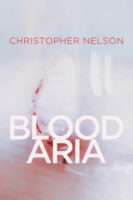Elemental Witness
 Guest Post by Michael Hettich.
Guest Post by Michael Hettich.
Perhaps the most striking characteristic of Blood Aria, given its poems’ formal dexterity, nuanced tonal shifts, and emotional depths, is that it is Christopher Nelson’s first full-length book of poetry. In its range of subject matter and at times harrowing emotional risk, as well as in the sheer dexterity of its strategies and tones, Blood Aria is a deeply powerful and necessary book, one of the richest first books of poetry I have read in years. This is work that reminds us of the depths of insight and feeling that are unsayable except in the most dexterous, courageous, emotionally capacious poetry; it reminds us as well of an essential human need that finds expression only in the best poetry’s capacity to speak through the blood and guts of being, balanced against the scintillating engagements of the formally-adept mind.
From the first lines of the first poem here, Nelson’s authority is indelibly established:
To you of the unimaginable
tomorrow, we loved you as you will loveas you will find a way to
endure this banishmentinto the singular island of a body
that will be gentlyworn to failure, like a solid pier
by the touch of waveswhich regard their work as
constant encouragement . . .(“A Dedication”)
This poem, like many in Blood Aria, takes a surprising but fully-earned turn a few lines later, graining and darkening the expectations these first lines suggest. Nelson’s command of line and syntax allows him to make poems that feel inevitable in their surprises—and are thus moving in ways that bristle with startling freshness and mystery.
In a period dominated by books of poetry employing a narrow range of formal types, tones, attitudes and subject matter, Nelson’s book stands out for its multitude of riches. His subjects range from intimate explorations of sexual identity and love to wrenching explorations into the nature of belief and the traditions of religion that determine that belief—and the self that believes—to the fact of cruelty and violence, to politically-engaged but never sloganeering statements of political and environmental witness. This is a book of engagement, one that explores the deepest currents of being, a book willing to attempt to say what is finally beyond the reach of language, a book of profound spiritual yearning and honesty. Again, it is Nelson’s rigorous handling of form, his facility with all aspects of poetic craft, that allows his poems to both reflect and reflect upon the larger world rather than on merely the self in its vicissitudes, the clear risk of such open-hearted work. That is to say, the etiquette of his formal dexterity allows Nelson to stay personally vulnerable while still creating powerful art. This characteristic is perhaps the book’s single most impressive achievement.
Finally, for all the ache, rage, grief, and pain rendered and plumbed in these poems, Nelson is a poet of immense tenderness. Perhaps this tenderness is the greatest of his many gifts. It is rendered most fully, for me, in some of his short, perfectly balanced lyrics, and particularly in the lovely “Fidelity,” quoted here in full:
Night comes first to the innermost
branches of the elm, then hedgerows, then entire lawns.My neighbor gets ready for bed, her one lit window and the red pulse
of a radio tower above the bay. Our backyards are small
and touch each other along one side.
Blood Aria is a singular achievement, and a haunting, profoundly beautiful book.
Blood Aria by Christopher Nelson. The University of Wisconsin Press, 2021.
Reviewer bio: Michael Hettich’s most recent book of poetry. The Mica Mine, has just been published by St Andrews University Press.
Buy this book from our affiliate Bookshop.org.




